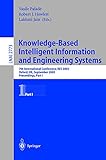Knowledge-Based Intelligent Information and Engineering Systems [electronic resource] : 7th International Conference, KES 2003, Oxford, UK, September 3-5, 2003, Proceedings, Part I /
Material type: TextSeries: Lecture Notes in Artificial Intelligence ; 2773Publisher: Berlin, Heidelberg : Springer Berlin Heidelberg : Imprint: Springer, 2003Edition: 1st ed. 2003Description: CII, 1476 p. online resourceContent type:
TextSeries: Lecture Notes in Artificial Intelligence ; 2773Publisher: Berlin, Heidelberg : Springer Berlin Heidelberg : Imprint: Springer, 2003Edition: 1st ed. 2003Description: CII, 1476 p. online resourceContent type: - text
- computer
- online resource
- 9783540452249
- Artificial intelligence
- Computer networks
- Information storage and retrieval systems
- Application software
- User interfaces (Computer systems)
- Human-computer interaction
- Business information services
- Artificial Intelligence
- Computer Communication Networks
- Information Storage and Retrieval
- Computer and Information Systems Applications
- User Interfaces and Human Computer Interaction
- IT in Business
- 006.3 23
- Q334-342
- TA347.A78
Keynote Lectures -- General Session Papers -- Invited Sessions Papers.
2.1 Text Summarization “Text summarization is the process of distilling the most important information from a source (or sources) to produce an abridged version for a particular user (or users) and task (or tasks)” [3]. Basic and classical articles in text summarization appear in “Advances in automatic text summarization” [3]. A literature survey on information extraction and text summarization is given by Zechner [7]. In general, the process of automatic text summarization is divided into three stages: (1) analysis of the given text, (2) summarization of the text, (3) presentation of the summary in a suitable output form. Titles, abstracts and keywords are the most common summaries in Academic papers. Usually, the title, the abstract and the keywords are the first, second, and third parts of an Academic paper, respectively. The title usually describes the main issue discussed in the study and the abstract presents the reader a short description of the background, the study and its results. A keyword is either a single word (unigram), e.g.: ‘learning', or a collocation, which means a group of two or more words, representing an important concept, e.g.: ‘machine learning', ‘natural language processing'. Retrieving collocations from text was examined by Smadja [5] and automatic extraction of collocations was examined by Kita et al. [1].


There are no comments on this title.